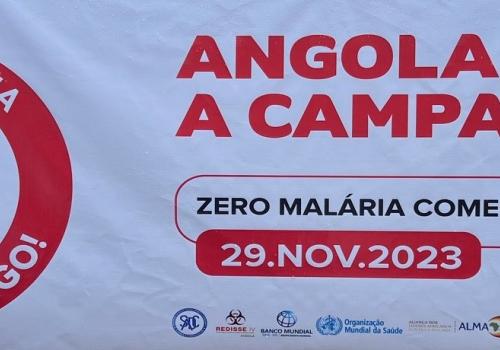Ministers of Health and Ministers responsible for HIV and AIDS commemorated the SADC Malaria Day under the theme “Resilient Health Systems and communities key to malaria elimination” in Luanda, Republic of Angola on the 29th November 2023.
H.E Dr. Silvia Lutucuta, Minister of Health of the Republic of Angola, and Chairperson of the SADC Ministerial Committee on Health, in her remarks applauded SADC Member States for their unwavering commitment to eliminate malaria in the region as witnessed by the reduction in mortality rate over the last decade. She called upon all stakeholders such as Private Sector, Civil Societies, Youth, International Cooperating Partners, amongst others, to support governments to fight and eliminate malaria through an integrated approach.
H. E Minister Lutucuta said that, despite the reduction of mortality rate in the region over the last decade, there still exist threats such as transborder transmission, access to health services and climate change that hinder elimination of malaria. She encouraged Member States to continue to mobilise resources and actions to fight and eliminate malaria in the region.
Ms. Angele Makombo N’tumba, SADC Deputy Executive Secretary for Regional Integration, in her remarks emphasised on the need to invest in health systems that are resilient, country-owned, and community led, in order to sustain and win the battle against malaria in the region.
She informed the audience that, the distribution of nets; training and capacity building; mass campaigns and advocacy remain important, but more needs to be done including doubling efforts to reach malaria elimination targets in the region. The gains made before the COVID -19 pandemic have been significantly reversed and Member States need to accelerate efforts especially in those countries who are closest to elimination which are Botswana, Eswatini, Namibia and South Africa, she said.
The Deputy Executive Secretary said that the SADC Windhoek Declaration of 2018 which was signed by Heads of State and Government in 2018 in Namibia, the SADC Protocol on Health, and SADC Malaria Elimination Strategy 2022-2030 together with other global and regional strategic instruments all provide clear strategic direction for the region. However, she outlined that these strategies will not yield desired results if they are not backed by resources.
Therefore, she urged Member States to mobilise resources and to request the International Cooperating Partners to fill funding gaps to successfully eliminate malaria. She further underscored the need to address climate change which has in recent years has contributed to the high level of disease. She indicated that there is need to find ways to navigate the climate crisis and find solutions to mitigate it as this is a challenge that we will continue to negatively affect the region for the foreseeable future.
International Cooperating Partners such as World Health Organization (WHO), United Nations Development Programme (UNDP), Roll Back Malaria Partnership, The African Leaders Malaria Alliance (ALMA) and the Joint United Nations Programme on HIV and AIDS (USAIDS) delivered supportive statements and reiterated their commitment to support SADC’s strategies, programmes and initiatives in its endevour to eliminate the malaria in the region.
SADC Malaria Day is commemorated annually and hosted by the Chairperson of SADC as part of the Ministers meeting.

